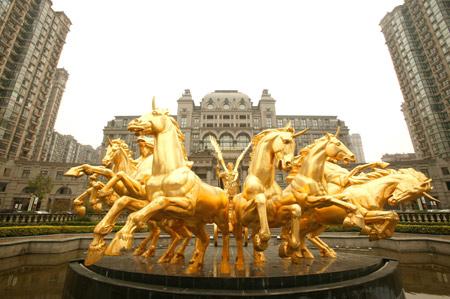 A golden fountain at a high-end residential complex in Beijing. At the end of 2009, China had 670,000 households with more than $1 million wealth.[Photo/Agencies]
A golden fountain at a high-end residential complex in Beijing. At the end of 2009, China had 670,000 households with more than $1 million wealth.[Photo/Agencies]Capital markets, private firms help fuel growth in nation's rich
BEIJING - China boasts the third-largest population of millionaires in the world, behind the United States and Japan, the Boston Consulting Group (BCG) said on Thursday.
At the end of 2009, China had 670,000 households with more than $1 million wealth, up 60 percent from the same period in 2008. And the country's composite wealth grew by some 28 percent from the end of 2008 to the end of 2009, to $5.4 trillion, BCG's latest research shows.
"The fast increase is driven by China's strong economic growth, the rise of private-sector enterprises and the development of capital markets," said Frankie Leung, partner and managing director of BCG.
According to BCG's research, entrepreneurs account for the majority of China's high-net-worth population (those with assets under management exceeding $1 million), but there are growing numbers of wealthy Chinese who have different sources of wealth, such as executives, professional investors, and the independently wealthy.
In addition, the mix of entrepreneurs is diversifying beyond real estate, manufacturing and commodities into industries such as the pharmaceutical and high technology.
Meanwhile, wealth is spreading beyond coastal regions to second- and third-tier cities throughout the nation.
In 2009, Guangdong, Zhejiang, Jiangsu and Shandong provinces, and Beijing and Shanghai accounted for more than half of millionaire households' wealth. But the central and western regions are expected to attract more investment during China's 12th Five-Year Plan (2011-2015), thus laying the groundwork for wealth to spread across the nation, and, more specifically, to cities away from the coast.
Despite its remarkable growth, China's composite wealth still has tremendous room to expand.
China accounts for only 5 percent of global wealth, less than its share of the global GDP (7 percent). And millionaire households account for only about 0.2 percent of all Chinese households, a far lower concentration than in the United States (4.1 percent) and Switzerland (8.4 percent).
"The sheer volume of new wealth presents an attractive opportunity for growth, but wealth managers should focus on the nuances of how and where this wealth will be created," Leung said.
Hong Kong is a popular investment destination and place to take up residence for wealthy mainlanders, many of whom have homes there. The city has become an increasingly important offshore wealth center for the mainland's wealthy.
"This is a key opportunity for foreign wealth managers, as well as for (mainland) wealth managers who have a presence in Hong Kong," said Nelson Choi, principal of BCG. "Wealth managers need to assess whether their current capabilities will allow them to grasp this growing opportunity."
But China's onshore market may not contribute significantly to the growth and profitability of overseas wealth managers in the near future, due to strict regulatory constraints on products that can be sold.
"Wealthy Chinese prefer to keep most of their assets onshore, due to the appreciation potential of renminbi," Choi said.





